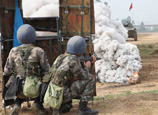
OFFICIAL DENIAL
The comprehensive management committee of Beijing's Dongcheng district denied the accusation on Tuesday.
A committee official said on condition of anonymity that the officers took only "waste and garbage" and did not take any coats or quilts.
"The looting accusations are unfair," the official said.
He said the committee has frequently received reports from local residents complaining that vagrants have blocked sidewalks with their bedding.
"We launched a 'clean-up and aid' campaign on Saturday along with the civil affairs department, public security bureau and the environmental protection agency," the official said.
The official said they found more than 20 homeless people in the area and tried to persuade them to move away. "Most people left. One of them said he wanted to go home, so we bought him a train ticket."
However, most homeless have no choice but to sleep on the streets.
"I don't know where to go. I can only find another street corner to avoid being thrown into an asylum and eventually sent back home. I prefer it here because I have no family left in my hometown," said Li Zhen, one of the city's homeless.
Similar thefts have been reported in other cities. In 2010, about 200 migrant workers had their bedding forcibly taken away in the city of Zhengzhou in central China's Henan province.
A similar incident occurred in Changsha, capital of central China's Hunan province, on Monday.
"No one has the right to take away a law-abiding citizen's personal belongings, not city administrators or other officials," Yu said.
The government has an unshirkable duty to provide real help for the homeless, he said.
"Citizens' rights should prevail over local officials' desire to keep up the city's appearance," said Shenzhen University professor Wang Yongcheng.
"Cities should be more tolerant of vagrants and beggars," said Wang. "Disadvantaged people are found in every city around the world. Local governments need to step up efforts to help them instead of turning them away," he added.















 This group of photos engrave the "past" left far behind us. For some, we may not even have chance to say goodbye.
This group of photos engrave the "past" left far behind us. For some, we may not even have chance to say goodbye.


![]()
